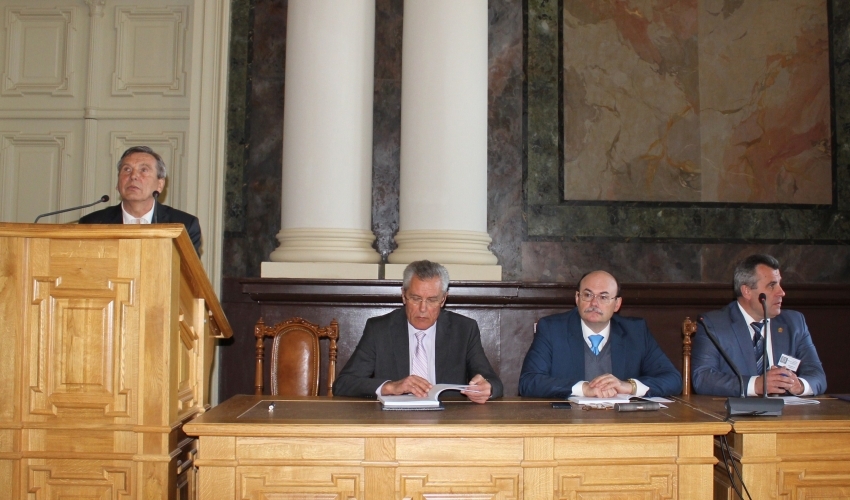
Almost 200 participants from five countries of Europe came to take part in the 3rd International Academic Practical Conference «Quality Management in Education and Industry: Experience, Problems and Prospects» commemorating Professor Petro Stolyarchuk.
Yuriy Bobalo, Lviv Polytechnic Rector, greeted the participants of the conference. He said that Academic Board and University leadership make great efforts not only to increase the number of students but also to raise the quality of education, to establish the image of Polytechnic, its place in Ukrainian and world ratings. Yuriy Bobalo is one of the team of authors of the report entitled «Building up the system of providing the quality of educational activity and higher education quality within Lviv Polytechnic National University», which was published as a separate book before this conference.
Professor Mykola Mykyichuk, Director of the Institute of Computer Technologies, Automation and Metrology, moderator of the plenary session, said in his opening speech that Petro Stolyarchuk, ScD, Head of the Department of Metrology, Standardization and Certification at Lviv Polytechnic, who passed away last year, had climbed a lot of steps in his career ladder. He was born in the village of Toporiv in Lviv region. In 1968, he graduated from Lviv Polytechnic. In 1968–1982, he had leading posts in «Termoprylad», participated in creating new means of automation and temperature gauging in nuclear, chemical and metallurgic fields.
For 35 years, Petro Stolyarchuk was working in Lviv Politechnic, where he continued fruitful research and methodological work. While he was Head of the Department, a progressive system of training experts in such specialities as «Quality, standardization and certification» and «Metrological support of testing and product quality», which engaged experts from the state enterprises «Systema» and «Lvivstandartmetrolohiya», was developed. An academic school on the issues of metrology, standardization and quality management was created here. A subject-methodology commission dealing with the quality issues was created. Petro Stolyarchuk was the author of more than 350 research works, 38 author certificates and patents. He supervised 15 candidate and 10 doctoral dissertations.
Oleh Davydchak, University Vice-Rector for Education, made a report at the plenary session. According to his information, the system of internal providing of the quality of education is based on the following components: defining the principles and procedures for providing the quality of higher education, monitoring and reviewing educational programs, annual assessment of those who obtain higher education, lecturers and professors of a higher educational institution, providing further training, availability of the necessary resources to organize the learning process, particularly independent work of students according to each educational program, providing information systems to ensure management efficiency, providing public access to the information on educational programs, effective system to prevent and reveal academic plagiarism in research works and in those who obtain higher education.
Andriy Shevtsov, Director of the Department of higher qualification staff appraisal and licensing at the Ministry of Education and Science of Ukraine, spoke not only about the issues of methodology for engaging external factors in education quality management, but also gave interesting information on the certification of the leading universities in the USA, namely Harvard University, Boston University and Texas University. The speaker debunked the myths that these and other higher educational institutions do not undergo certification. There are also certain bureaucratic procedures there. They may last up to three years. Another myth is the absence of continuous monitoring and control on the part of the government and certification organizations. Every 5 years, higher educational institutions have to make an interim certification report. Apart from this, there is a state inspection which checks state educational institutions and monitors the work of all higher educational institutions.
As far as Ukraine is concerned, we have a unique chance to create a new certification system preserving the principles of impartiality, independence, professionalism and transparence.
Iryna Vasylivna, Petro Stolyarchuk’s widow, and his daughter Olena were among the guests of honor at the conference.
A separate section on the issues of metrological support for testing and product quality worked at the conference. There were some interesting reports on the quality of electric energy, semi-conductor sensors for digital gauging of the temperature differences, assessing the quality of irrigation water, sewage, circular welding pipelines. The report «Studying milk for containing forbidden additives» attracted attention of the conference participants.
We talked to Professor Mykola Mykyichuk, Director of the Institute of Computer Technologies, Automation and Metrology.
– Professor Mykyichuk, however perfect the system of the learning process quality management might be, university graduates will not be competitive if they have not got skills of practical work. Our weak spot is the student internship base.
– We are aware of this. Out leading departments are establishing direct contacts with foreign companies. At the Department of Measuring Information Technologies, one German company will open a laboratory for various physical measuring in June. The Department of Information Security has received sponsor aid. Apart from the pre-diploma internship, we are bringing back industrial internship for students during the learning process. We are trying to find new companies and institutions that are willing to provide our students with internship opportunities.